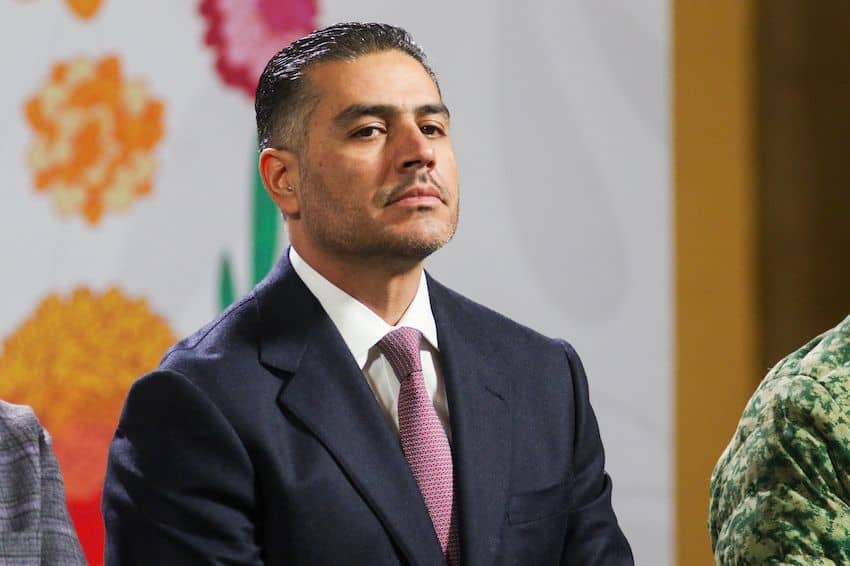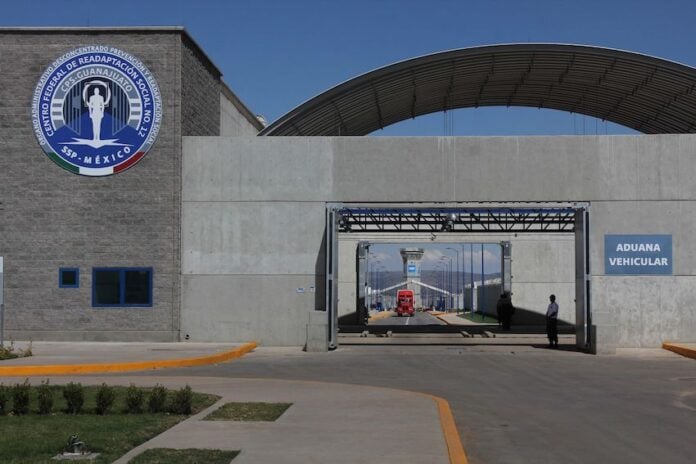Extortion attempts over the telephone commonly originate in Mexican prisons, Security Minister Omar García Harfuch noted on Tuesday.
Speaking at President Claudia Sheinbaum’s morning press conference, García Harfuch reported that 56% of the “telephone lines” that were used to make extortion attempts in recent months, and which were reported to the federal government via its 089 crime hotline, were located in 12 prisons.

“To prevent this crime from being committed inside prisons and to protect citizens, joint intelligence actions, signal blocking, technological inspections, and supervision operations have been implemented,” he said.
“For this purpose, signal jammers, advanced closed-circuit systems, motion sensors, security scanners, and technology are being installed in federal penitentiaries,” García Harfuch added.
The security minister said that 33% of the almost 2,400 numbers known to have been used in recent extortion attempts have been “blocked,” including by removing or changing antennas at two prisons in Tamaulipas, and by implementing a “total block” on “3G and 4G services” in Santa Martha Acatitla, a Mexico City neighborhood where men’s and women’s prisons are located.
“In the first quarter of 2026, the [cell phone signals at] 14 federal prisons and the 13 Mexico City prisons will be blocked,” García Harfuch said.
He also said that since the national strategy against extortion began in July, federal authorities have carried out “revisions in the 275 penitentiary centers” across Mexico.
“Modems, telephones, chips, drugs and weapons have been seized in these revisions,” García Harfuch said.
Prisoners have been making extortion calls in Mexico for years. In 2023, the newspaper Reforma reported that 10,000 extortion calls per day were being made from Mexican prisons, resulting in significant earnings for “gangs of inmates.”
The use of mobile phones by prisoners is supposed to be banned, but enforcement of the law is lax in many cases.
Among the ways criminals seek to extort money is by telling innocent citizens over the telephone that one of their family members has been kidnapped.
“This type of [extortion] call is the most common and the most aggressive, as it threatens direct violence,” wrote academic José Isabel García Requenes in a paper titled “Extortion in Mexico.”
“The criminal indicates that he has kidnapped a family member or close person and threatens to kill or harm them. In some cases, the voice of the alleged abductee can even be imitated through a recording. … Large amounts of money are asked for and a payment period is imposed,” wrote García, an academic at the Autonomous University of Zacatecas.
Criminals also call business owners to demand regular payments known as derecho de piso (or cobro de piso).
Government has received more than 80,000 reports of extortion since July
García Harfuch said that the government, via its 089 hotline, has received 83,800 calls from people reporting extortion since the national anti-extortion strategy was launched in July.
He said that 8,682 of those calls — “in other words 10% of the total” — related to acts of extortion that were successfully committed.
Those reports were referred to state-based prosecutors’ offices, García Harfuch said.
Authorities launch national strategy against extortion to tackle a pernicious and widespread crime
“We appreciate the public’s trust in making these reports and contributing to numerous investigations that have allowed us to apprehend those responsible for this crime, and to block the [telephone] numbers [they used] almost immediately,” he said.
García Harfuch said that between July 6 and Nov. 3, a total of 478 people were arrested across 22 states on charges of extortion.
Reported cases of extortion have declined in recent months
Earlier in Sheinbaum’s press conference, the head of the National Public Security System, Marcela Figueroa Franco, reported that there were 27.45 reported acts of extortion in October, a 14% decline compared to July, when the national anti-extortion strategy began.
However, the vast majority of acts of extortion and attempted extortion are not reported, mainly due to fear of reprisal. According to Francisco Rivas, general director of the National Citizens’ Observatory, more than 99% of acts of extortion committed in Mexico are not reported to authorities.
With reports from La Jornada
